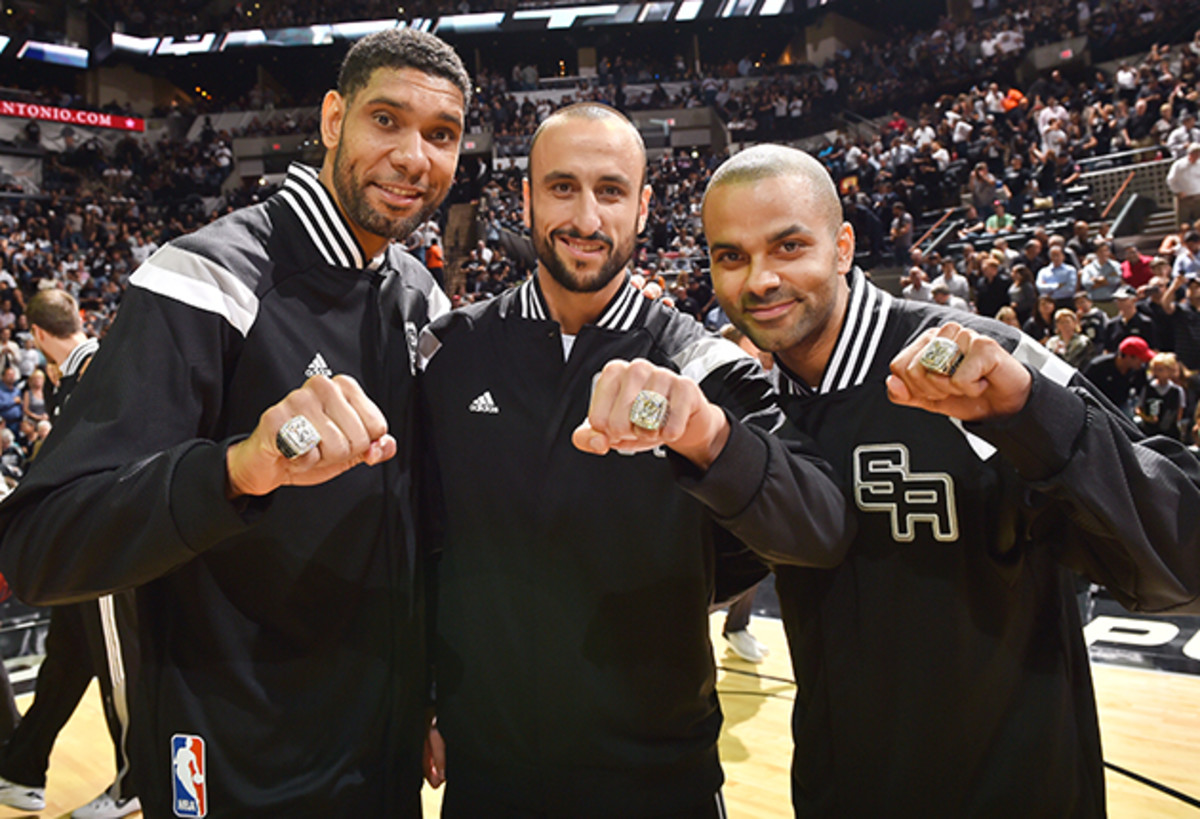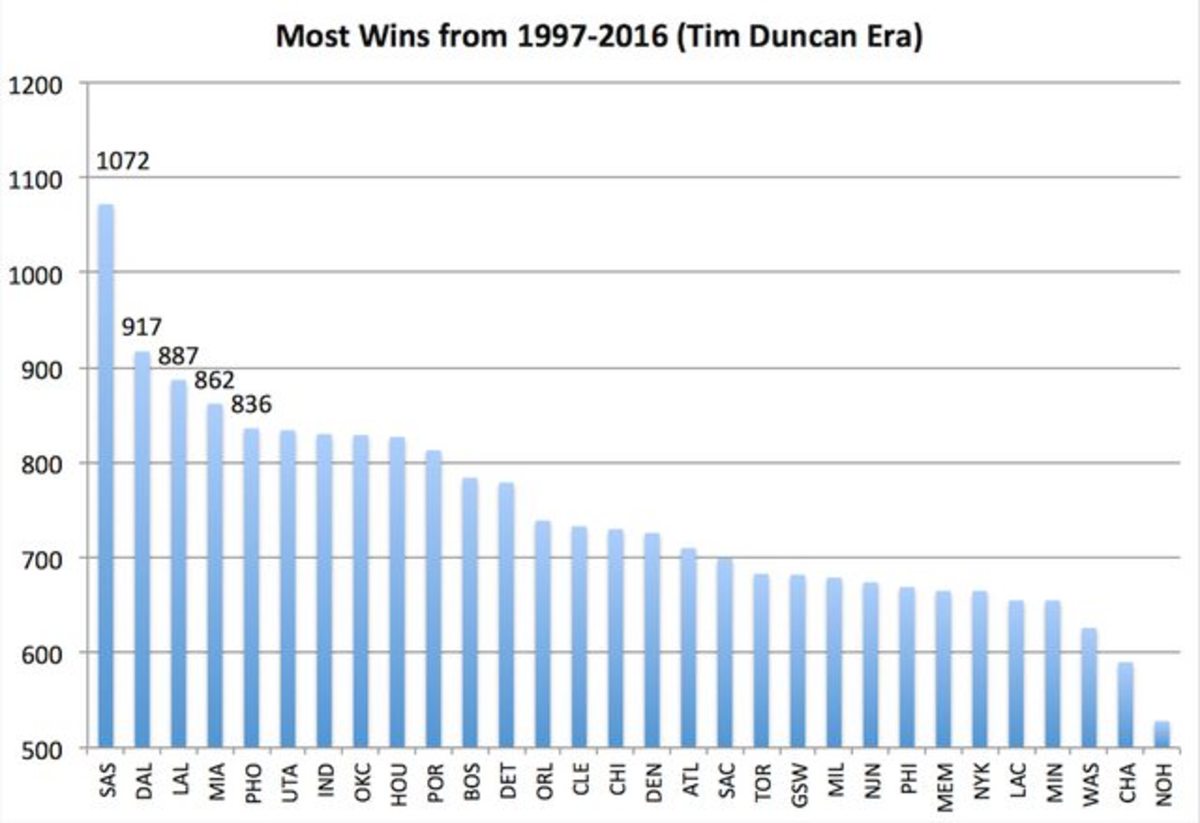The solution: Tim Duncan served as Spurs' trump card for two decades

Your teams. Your favorite writers. Wherever you want them. Personalize SI with our new App. Install on iOS or Android.
Two years before he walked away, but still a good half-decade into the “old man” wisecracks, Tim Duncan and the Spurs looked headed for a second consecutive heartbreak.
The sting of the 2013 Finals had motivated them to a brilliant regular season and a dominant playoff run, and yet problems suddenly appeared from every direction in Game 6 of the West finals. Serge Ibaka had returned to the series, shoring up Oklahoma City’s defense and providing a major emotional lift. Tony Parker left Game 6 with a nagging injury, leaving San Antonio to get by with young replacements.
With new life in a series that had opened in one-sided fashion, Kevin Durant and Russell Westbrook, two elite athletes and competitors who were both more than a decade younger than Duncan, were going full blast and rarely leaving the court. The Chesapeake Energy Arena crowd, always deafening and engaged during the playoffs, remained standing for much of the stretch run.
• The many lives of Tim Duncan | Duncan retires without a whimper

Duncan didn’t flinch, not when Parker was shut down with an eye injury towards Game 7, not in response to Durant and Westbrook flying all over the court like they had in the 2012 West finals and like they would in the 2016 semis, not in the face of the tough crowd, and not in response to a tough shooting night or the prospect of playing an extra five minutes at age 37.
No, Duncan simply went to work. With less than three minutes left, he methodically backed down Ibaka, bumping, bumping, reversing, pumping up-and-under, banking and finishing. A minute later, Duncan was back at it again, drop-stepping through the paint on Ibaka, rotating like a sun dial as he went through the slow-motion move, to set up a turnaround look that earned him go-ahead free throws. Then, with less than 30 seconds left, San Antonio painstakingly worked to exploit a mismatch between Duncan and Reggie Jackson. With the ball on the block and the much smaller Jackson on his back, Duncan was simply too big and too fundamental: one rhythm dribble and a drop-step set up a clean fade-away that slowly rattled in.
• Retirement commemorative: A special farewell to Tim Duncan
Much like Duncan, the game-sealing shot was in no particular rush. Westbrook doubled over at the waist in frustration when it finally hit net. Duncan tugged on his jersey in muted celebration. Game 6 was the most serious trouble the Spurs faced en route to the 2014 title, and the ageless Duncan had outsmarted, outplayed, and outlasted the opposition once again.
“We just started to give him the ball, and he gave us solutions,” Manu Ginobili said.
Indeed, Duncan wasn’t merely an answer for San Antonio. Over nearly two decades, Duncan was The Solution, a sophisticated, understated, overlooked all-timer who claimed five titles and reached an unmatched level of sustained success in a single market. For 19 straight years, San Antonio won at least 60% of its games and made the playoffs. For 18 straight years, every season until his swan song, Duncan posted a Player Efficiency Rating above 21. He made 12 straight All-Star Games (15 in all), earned 15 All-NBA selections, and took home 15 All-Defensive selections.
His reliability was aided by his availability: Duncan logged 2,000+ minutes 16 times in his career, and he retires ranking in the top 10 in games, minutes played, rebounds and blocks. He never once killed a coach, enjoying perhaps the greatest marriage in NBA history by playing for Gregg Popovich from age 21 to age 40.
• Players react to Duncan's retirement | Spurs add Gasol to replace Duncan

Duncan was The Solution to so many different conundrums along the years. How could the Spurs make the best of David Robinson’s twilight? How could the Spurs move on from the Robinson era? How could a small-market team compete with the glitzy Lakers and, later, the rise of Superteams like LeBron James’s Heat? How could a defense-first champion successfully transition into a more potent approach during a faster era? How could a team whose players enjoyed so much success at a young age keep everyone happy and keep the band together? How could an organization afford to prioritize rest and the long-term development of its players?
All of it was possible because of Duncan, who functioned equally well in a throwback “Twin Towers” with Robinson as he did alongside stretch four Boris Diaw in more recent years. By never leaving San Antonio, Duncan made life easier for Popovich and R.C. Buford in so many unquantifiable ways: His ever-presence guaranteed an elite defense, it encouraged Parker and Ginobili to stay home, and it set up a roster framework where the Spurs could chase specific niches like “3-and-D” wings who are both cheaper and easier to land than A-list free agents.
With a bedrock player and smart management, the Spurs never stopped dominating, racking up an eye-popping +6.55 point differential over 19 years. That’s an impressive figure for a single season—only three teams beat the mark last year—and that was San Antonio’s standard for longer than many 2016 lottery picks have been alive.
• Rare images of Tim Duncan through his 19-year NBA career

Duncan’s unselfishness and willingness to shift into a secondary offensive role late in his career allowed Parker to bloom into an MVP candidate and set the stage for Kawhi Leonard and LaMarcus Aldridge to carry on San Antonio’s winning ways after his retirement. His night-in, night-out two-way excellence allowed San Antonio to take the long view on everything from stashing draft picks overseas to strategically resting players during the season. He preferred to uncork the rocking chair post moves, work the mid-range for bankers, and hit backdoor cutters, eschewing the ball dominance and highlight-seeking that might have attracted attention and jealousy.
This all went on so quietly with such regularity and for so long that Duncan surely belongs among the most “taken for granted” stars in NBA history. Consider the chart below, which shows how the Spurs maintained the league’s best and most consistent defense, by miles, from the tail end of Michael Jordan’s championship run, through the Shaq/Kobe Lakers, through the “Seven Seconds or Less” Suns, through the Bryant/Gasol Lakers, and through the Celtics, Heat and Warriors super teams. Every other organization had up years and down years; the Spurs never truly fell.
• Duncan retires after 19 NBA seasons | Is Duncan best PF of all-time?

Again, Duncan was The Solution that made it all possible, with the block shots, the possessing-ending defensive rebounds, the well-timed rotations, the understanding of his opponent’s tendencies and weaknesses. He owned the paint past his 40th birthday without resorting to dirty play or intimidation tactics, and he did it while rarely compromising his team’s chances by getting in foul trouble. The worst thing you could say about his style of play is that he bugged his eyes out when he disagreed with a call.
Duncan never changed jersey numbers to spike sales, his free agency decisions never evolved into Decisions during the social media era, and his patented patterned button-downs and baggy jeans strongly suggest that he never kept a stylist on his payroll. In 1997, he was already dreaming of quietly riding off into the St. Croix sunset on a jetski, and his retirement announcement came, predictably, via emotionless press release rather than the teary-eyed tributes of a Farewell Tour.
The last chapter for Duncan came in another Game 6 against the Thunder, on the same Chesapeake Energy Arena court as his 2014 triumph. This time, Duncan and the Spurs were simply overwhelmed by Oklahoma City’s prime talents. They couldn’t keep pace. There wouldn’t be an overtime showdown or a final chance to give Duncan the ball and wait on the solutions.
He left the court without a signature jumper over Bryon Russell, without a mic drop, and certainly without plans for a comeback. On his way off, Duncan raised one finger to the crowd, not to stake a claim at greatness, but to offer an acknowledgement and thanks. He knew it was time to go, and he knew the jetski wasn’t going to ride itself.
